Movie Review – Blind Side, The
Principal Cast : Sandra Bullock, Tim McGraw, Quinton Aaron, Kathy Bates, Brandon Rivers, Jae Head, Lily Collins, Ray McKinnon, Kim Dickens, Adriane Lenox.
Synopsis: Young homeless black man Michael is taken in by high society wife Lee Anne Tuohy and given a second chance at life. When he displays an aptitude for football, they steer him towards the college system and eventually, the NFL.
**************
With the hurricane of Oscar publicity swirling about her, earlier this year Sandra Bullock’s world came crashing down a day or two later when her husband came out and declared he’d cheated on her. Bullock subsequently went into hiding, and much of the good word about The Blind Side became blurred with talk of infidelity and scandal. Now, upon the release of The Blind Side on DVD and BluRay, much of that scurrilous gossip has subsided to the point where the film can be viewed and discussed without prejudice or sidetrack. Was it a good film, worthy of contention for Oscar? Was Bullock’s Oscar winning performance actually good enough to justify the award, or was it, as commentary might suggest, a “career” Oscar, awarded at the most opportune moment?
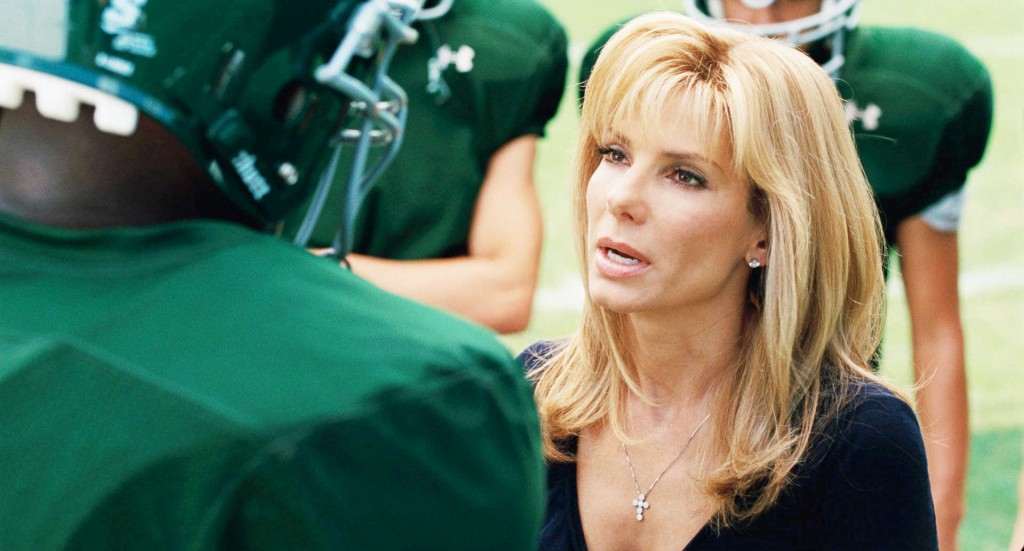
The Blind Side tells of the rise of Michael Oher (Quinton Aaron), a young black man from one of the poorer sections of Memphis, Tennessee. Michael leaves home, sleeping on couches of friends and relatives because his mother, a drug addict, cannot look after him. When the film opens, a friend of Michael’s is trying to get the football coach of a local high school to take him on as a player, even though he’s never played before. Due to Michael’s sheer size and strength, the coach agrees, even in the face of opposition from other staff at the school who see Michael as a no-hope prospect educationally. One night, while walking along a street on the way to the local laundromat (the only place warm enough to sleep), Michael is picked up by the Tuohy family as they drive home from a night out. Tuohy matriarch, Lee Anne (Sandra Bullock) gives Michael a bed for the night, fully expecting to be robbed by morning, after discovering that he has nowhere to go. What begins as a one night stay eventually turns into an induction into the family, as they grow to love him unconditionally, Michael’s relationship with Lee Anne being the key to the entire story.
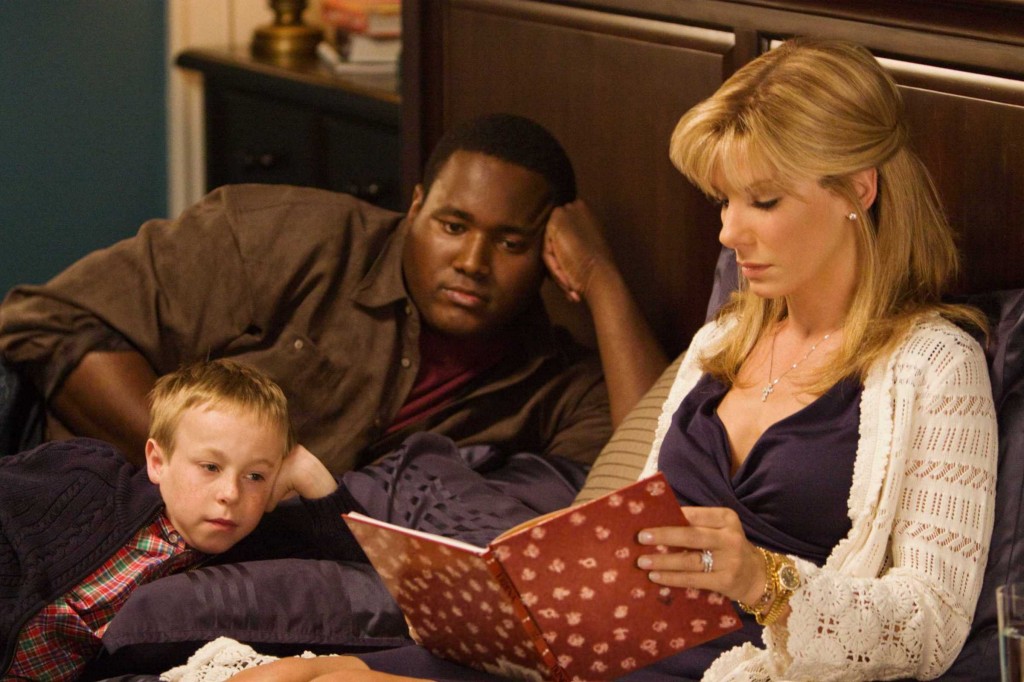
Essentially a sport/drama, with plenty of heart-warming moments to keep the female viewers happy, The Blind Side does nothing new in terms of it’s character driven narrative, nor does it excite with the expected football action scenes: often I felt that the film moved across well-trod ground and never tried to be brave or provocative. Almost all the sport-film clichés, especially when the film went “to the game”, were trotted out once more, and in yawn-inducing simplicity. The mouthy yobbo seated in the crowd behind the family supporting the central character, who ends up being put in his place, as well as the mouthy yobbo on the field who gives a bit of lip to the central character, who also ends up being put in his place; they’re all there. John Lee Hancock’s directions feels flat and uninspired, especially in the more active moments of the film, where his editing and camera placement remain fairly limited to observer status, rather than participant. This style of filming leaves the intended emotional uplift strangely limp, a kind of tepid and timid style that smacks of a television mentality. Hancock did a better job with sport on film with Dennis Quaid’s The Rookie, for Disney, and managed another directing gurnsey for his not-quite-John-Wayne remake of The Alamo.
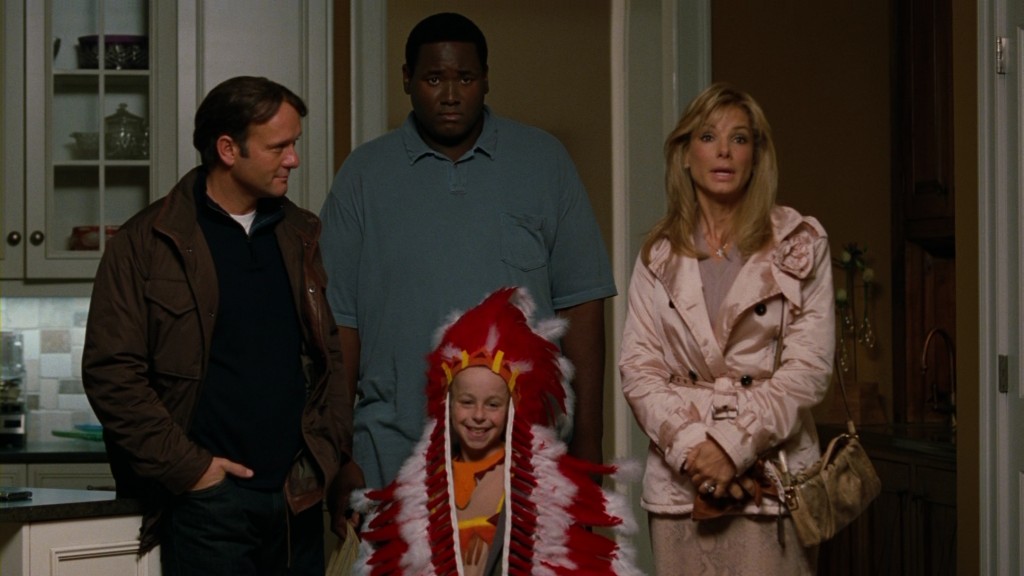
The narrative, revolving primarily around Michael and Lee Anne, is of the most superficial variety, with almost no character development between them save only that which progresses the story along. Michael comes across as an idiot, or at least a super-shy one, which makes the actions of Lee Anne, a woman living the society lifestyle (due to her husband owning a large number of fast food outlets around the city) to befriend and care for a black homeless man a little hard to swallow. The story is largely factual, based upon the novel of the same name telling the story of how Michael Oher came to prominence, but the film seems to skip the fine details and focus on just the ones guaranteed to warm the cockles of your heart. There’s no grit, no substance here, and it seems hard to understand how this film came to be nominated for an Oscar at all, let alone for Best Picture. The characters don’t seem to really bond, not in the way the real-life counterparts did, anyway. The chemistry between Aaron and Bullock is very mother/son, but for some reason the relationship between Michael and the Tuohy’s youngest child, SJ (Jae Head) is not only more interesting, but more developed.
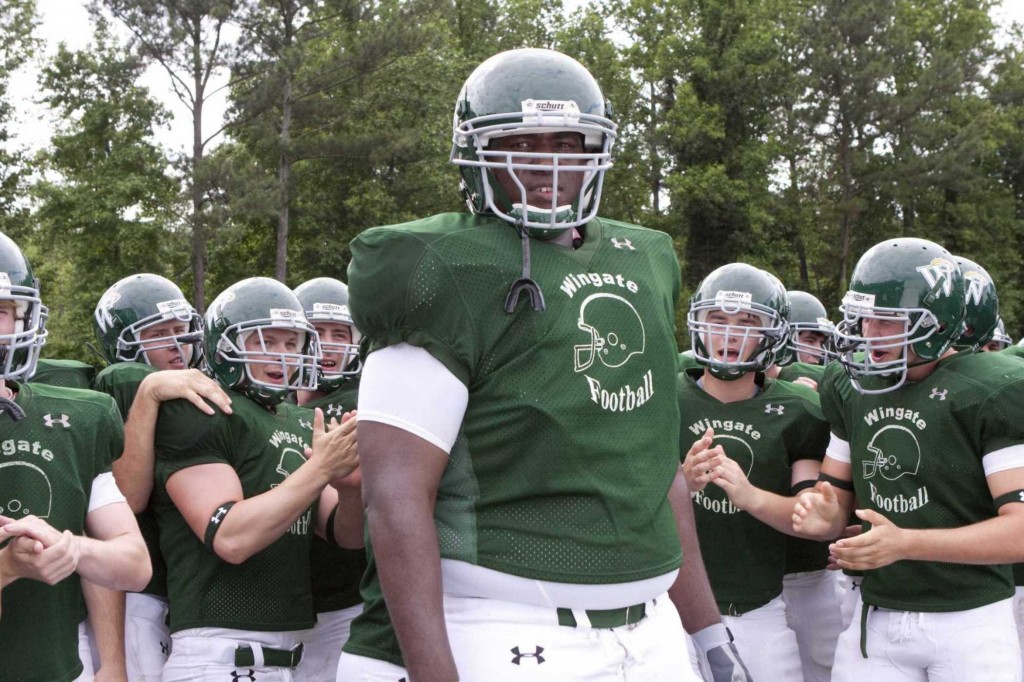
The casting is excellent, story issues aside. Bullock is solid, if unremarkable, as Lee Anne Tuohy, her blonde “do” unable to make her seem more dramatic than the script will allow. Quinton Aaron is a revelation as the bulky, enormous Michael Oher, his soulful eyes driving his performance in a way a lack of dialogue cannot. Aaron’s role should have been nominated for an Oscar, rather than Bullocks. Tim McGraw is wonderful as Lee Anne’s supportive husband Sean, and of all the characters in the film, his is the one I most identified with. The aforementioned Jae Head, as SJ, is amusing, if a little “stagey” in his performance; he’s a child actor and his acting ability is limited to his life experience, and as such could be considered the weakest of the film. But he’s engaging enough to overcome such limitations. Kathy Bates makes a welcome addition to the film as a tutor hired by the Tuohy’s to get Michael’s grades up so he can get a football scholarship: one memorable scene between her and Michael, where she informs him of bodies buried underneath a football oval in Tennessee, is the best of the film, mainly due to her performance here.
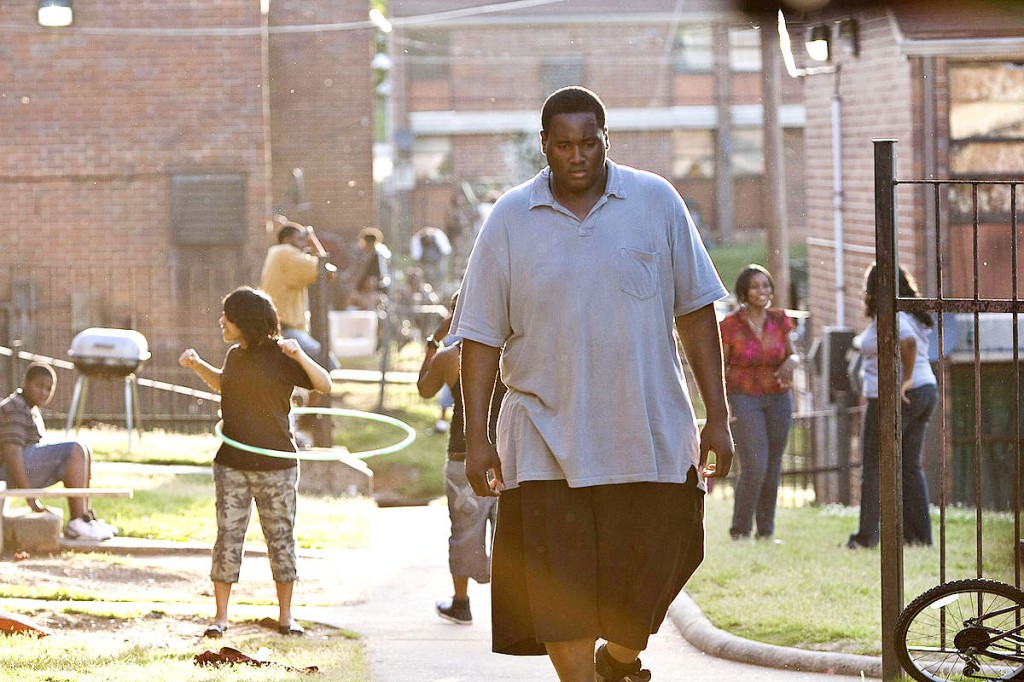
As mentioned, the direction is a little lacklustre overall. The Blind Side plays more like a Hallmark Movie Of The Week than a major mainstream release, which may be due to the fact that the high-school football culture doesn’t resonate outside of the US. Indeed, I tend to think a fair amount of this film will be lost on non-US residents, or at least those unfamiliar with the intricacies of making it into the NFL. I like a good sports film as much as the next person, don’t get me wrong; The Blind Side is less an examination of racism and prejudice and more a film designed to make Bullock look good and cater to the politically correct Hollywood audiences. A key issue with the film is the inherent lack of central antagonist, at least one that could affect Michael’s rise to the NFL. There is a subplot involving one of Michael’s former gang leaders, which is as close to Bad Guy that the film gets, but the lack of definitive obstacle throughout the film impedes any dramatic tension. A somewhat late-in-the-game NFL bureaucrat arrives to investigate Michael’s rise to NFL prominence, but she’s despatched in relatively short order leaving the audience wondering why they bothered in the first place.
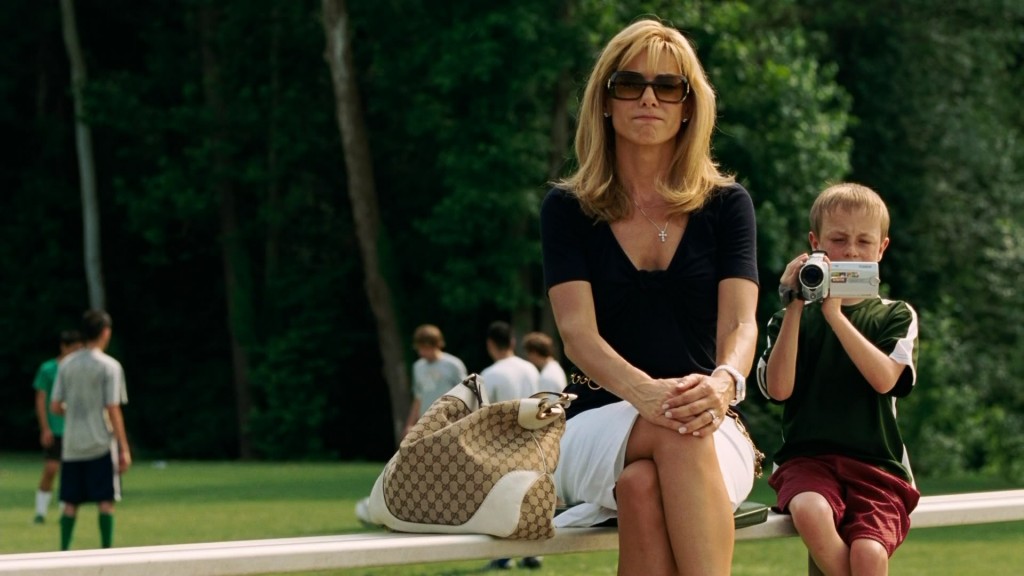
I liked The Blind Side, but as a light-weight sporting drama that plays out exactly as you’d imagine it would. I’m unfamiliar with the real life people this film is based on, and I have no real knowledge (or interest) in Gridiron football, to be truthful. I only ask that a film gives me character and a narrative worth watching, regardless of the surrounding palaver, and The Blind Side succeeds in only the most superficial way. Why does Lee Anne Tuohy take Michael into her home, really? A few throwaway lines in the film purport to give Lee Anna some sense of social guilt, but it’s never fully explained: in the film it exists simply for it’s own sake. Directorially, Hancock takes very few risks and generally, sides with the clichéd when bravery fails him. You could argue that he’s constrained by the story, and as such limited in the degrees he can “artistic license” the film overall, but there’s no sense of dramatic weight whatsoever. It might end up making you feel aw shucks good, but it’s immediately forgettable.

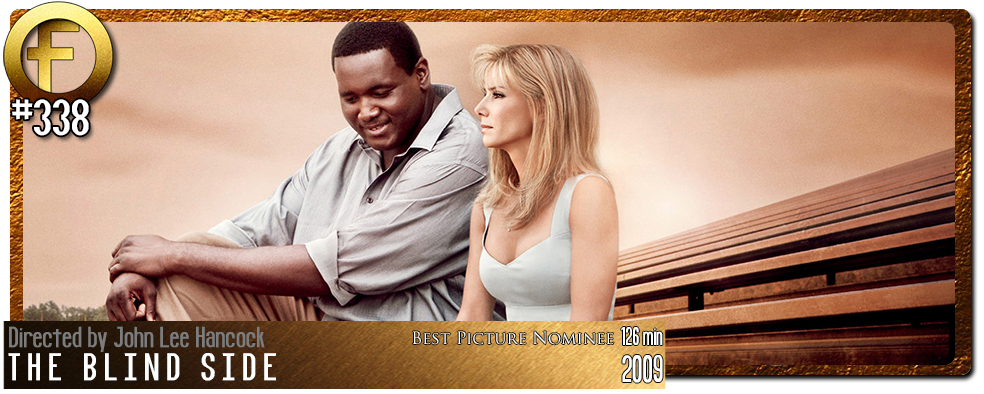
You know, I didn't hate this. It was a relatively swift and entertaining movie although it really stooped to the lowest denominator. The main problem was that Sandra Bullock simply wasn't deserving of an acting Oscar for this performance. There simply wasn't much of anything challenging and her character barely evolved (if at all) from beginning to end. While the real Mrs. Tuohy may have faced criticisms and frowns for what she said, there is absolutely no consequences for it when you do it in a movie.
The only thing i hate more than romantic comedies are inspirational sports movies. Even if they have Sandra Bullock. Thank god this thing never made it to Yeamen.